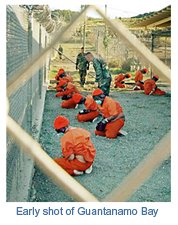(Published in The Huffington Post, May 19, 2011)

The torture debate has once again seeped into the public discourse in America, and it has us focusing once again on all the wrong issues. Suggestions have been made that information that Khalid Sheikh Mohammed provided while being water-boarded helped lead the CIA to bin Laden’s door. This has prompted the likes of John Yoo (author of the notorious torture memos signed by Jay Bybee) and former Attorney General Michael Mukasey, to argue that the case for water-boarding has been vindicated. Others, including Senator John McCain, have refuted the assertions that the trail to Bin Laden can be traced back to so-called “enhanced interrogation techniques.” In short, the debate is once again centering on the question of whether torture is effective.
First, it should be noted that the debate misconstrues the effectiveness argument. Few people would assert that torture can never produce so called “actionable intelligence.” The point, made extensively by FBI interrogators and other specialists in the field, is that torture produces less reliable intelligence than traditional (and lawful) methods of interrogation, since the victim will say anything to avoid the pain, some of it true but much of it not, creating the problem of trying to distinguish between fact and fiction. Moreover, a policy of torture creates longer term strategic costs in the effort to win over hearts and minds, which ultimately makes it counter-productive and ineffective from a broader perspective.
The key point, however, is that effectiveness is entirely beside the point. We should oppose and reject the use of torture even if it could be shown that it is effective. To his credit, John McCain also makes this argument. For those who do oppose torture, it is a profound mistake to be engaging in this debate about effectiveness. First of all, the arguments get reduced to the overly simplistic and binary question of whether it ever works, which is of course vulnerable to attack — just one example of torture producing one piece of accurate intelligence tends to undermine the entire position. Hence the debate today. But more importantly, engaging in this debate tends to suggest that if torture were found to be effective, then perhaps we might have to use it. But we would not, or should not, so why get trapped in this debate? We ought to stick to the real reasons for our objections.
Read more



 It is useful to compare this position with the 1995 judgment of the Supreme Court of Israel, in which the Court rejected government arguments that it could find ex ante authority for harsher interrogation techniques in the principle of necessity.
It is useful to compare this position with the 1995 judgment of the Supreme Court of Israel, in which the Court rejected government arguments that it could find ex ante authority for harsher interrogation techniques in the principle of necessity.